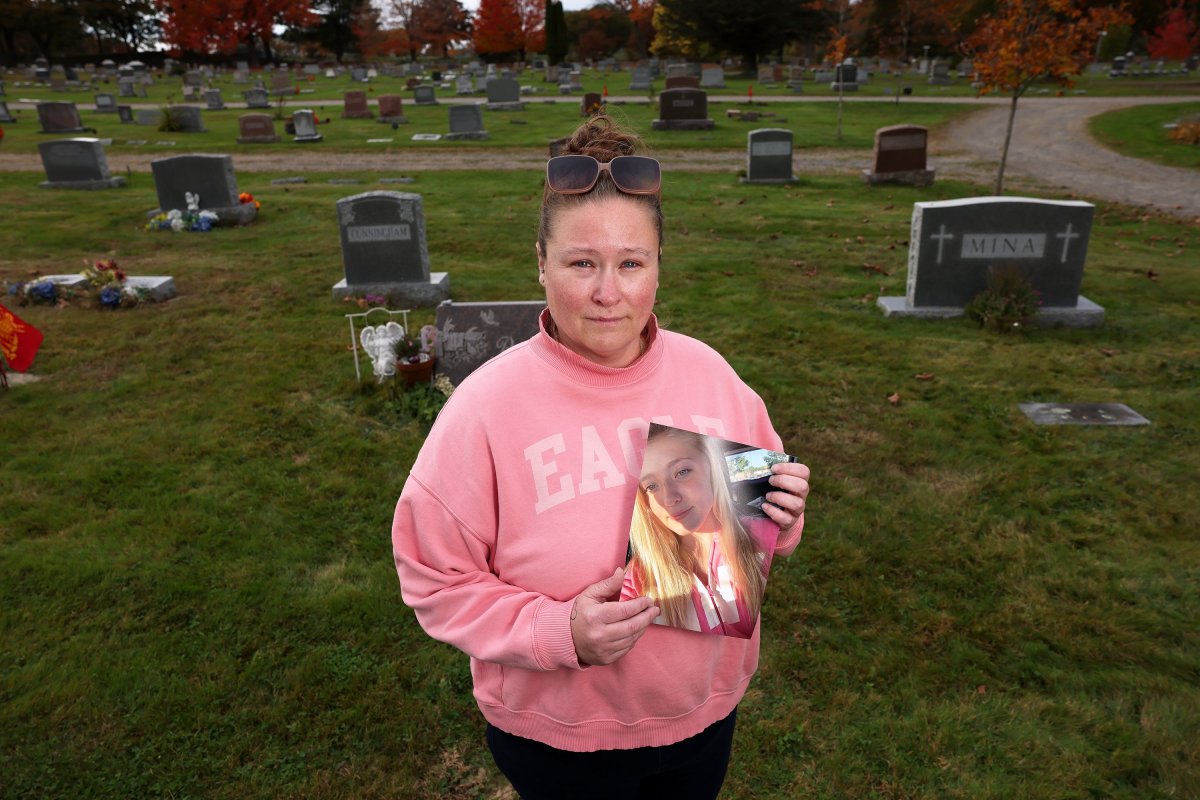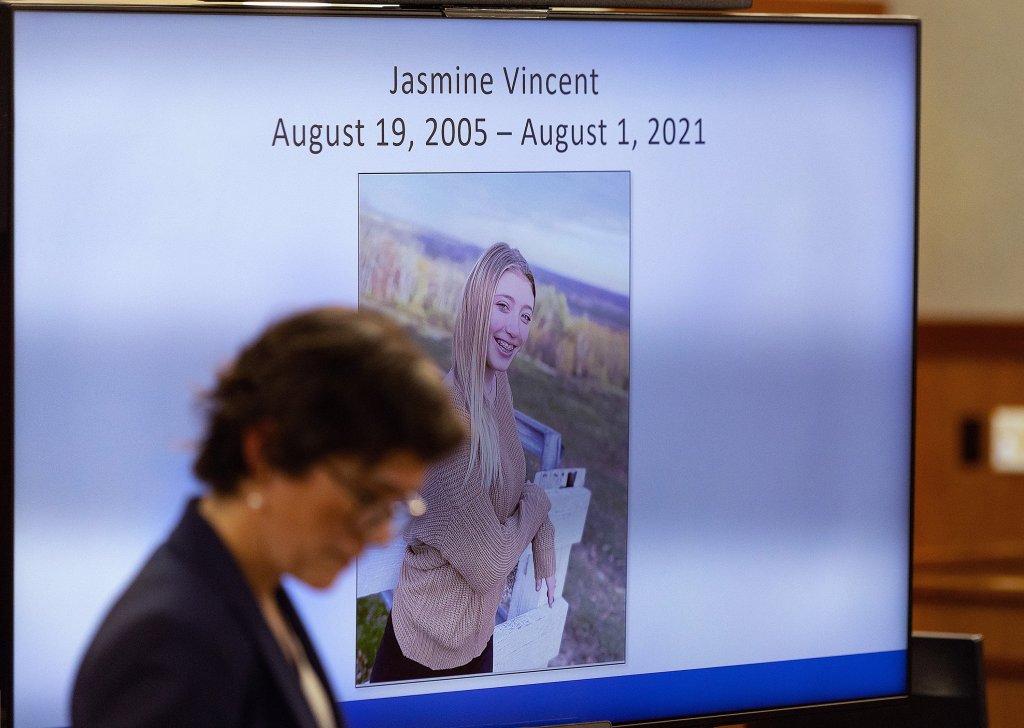
When a jury agreed a Brunswick health care office’s negligence contributed to a teenager’s death in 2021, it awarded the teen’s mother and estate $25 million — reportedly the largest amount of damages for a medical malpractice case in Maine’s history.
But the provider, Mid Coast Medical Group, will not have to pay it all.
Lyndsey Sutherland’s damages under Maine’s Wrongful Death Act for the loss of her daughter’s companionship are capped at $750,000, which was the limit in the law at the time of the teen’s death. Those damages accounted for $10 million of the $25 million awarded following a four-day trial last month.
The verdict also faces a legal challenge by Mid Coast, which requested either a new trial or reduced damages in a motion filed Friday. The motion claims Sutherland’s attorneys unfairly swayed the jury with suggestions for damages and “carefully crafted statements meant to prey upon and mislead the jury.” It also claimed the court unfairly limited Mid Coast’s ability to explore the alleged role of another health care provider that had cared for Sutherland’s daughter.
“This constellation of errors fueled a $25 million jury verdict — the largest medical malpractice verdict in Maine history — that was tethered neither to fact nor law,” Mid Coast’s attorney, Matthew Wahrer, wrote in the filing.
Sutherland’s attorneys have three weeks to reply before District Court Judge Michael Duddy, from Maine’s Business and Consumer Court, makes a decision.
If the case is appealed to the state supreme court, Sutherland’s attorney, Meryl Poulin, said they plan to challenge the constitutionality of a cap on wrongful death damages. Experts say the historic verdict may serve as a data point for other similar cases where jurors and lawyers struggle to place a dollar amount on the value of a person’s life.
“I think it’s clear that this verdict says Maine juries are willing to hold health care providers accountable when their negligence causes a death or horrible injury to an innocent person,” Poulin said.
For Sutherland, the case was about more than the money — it was about her daughter, Jasmine Vincent.
The teen had pediatric leukemia, which was not diagnosed until after her death.
“It was for Jazzy. It was her verdict,” Sutherland said in an interview with the Press Herald on Wednesday. “She’s not just a case or a verdict. She’s a real person, and she really is my Jazzy.”
THE CASE

Sutherland sued Mid Coast Medical Group, which is now part of MaineHealth, in October 2023, alleging the health care provider failed to order an X-ray or question her daughter’s unusual symptoms when she was referred to their office on July 26, 2021.
According to trial testimony, Vincent had complained that her breasts were discolored and swollen, making it hard for her to breathe, and that the veins running from her neck to her chest were bigger than normal. Gynecologist Dr. Danielle Salhany testified she told Vincent she could possibly have gynecomastia. An expert for Sutherland’s legal team testified that is typically a condition found in men using anabolic steroids, and advised that the 15-year-old quit using prednisone, a steroid-based medication she had been prescribed for pneumonia.
Experts testified they were not aware of any instances in which prednisone, an anti-inflammatory medication, has led to breast and vein swelling.
Salhany testified that her guidance to Vincent was being taken out of context and Wahrer argued at trial that Salhany did everything that could be expected of an on-call gynecologist who only met with the teen once.
Vincent died less than a week after the Aug. 1, 2021, emergency room visit.
A jury sided with Sutherland on Oct. 30, awarding her $15 million for what Vincent likely suffered while alive and $10 million, which is capped at $750,000, for her loss of companionship and emotional distress.
Some of that will be covered by a settlement Sutherland reached with Martin’s Point, Vincent’s primary care provider that also treated her in the weeks before her death.
Sutherland sued Martin’s Point and Mid Coast at the same time in October 2023. She settled with Martin’s Point before trial. That agreement will offset some of what Mid Coast has to pay by a “portion of damages attributable to Martin’s Point’s share of fault,” according to court records. Publicly available documents didn’t include a specific amount and a spokesperson for Martin’s Point declined to comment on Friday.
Wahrer argued in Friday’s motion that he was unfairly limited in his ability during the trial to explore Martin’s Point’s alleged role in the teen’s death. Duddy did not allow Wahrer to call on an expert, whom Sutherland had originally hired to testify about Martin’s Point’s care.
Poulin declined to comment on Wahrer’s arguments Friday, saying only that her client “had hoped that Mid Coast would do the right thing, in light of the jury’s verdict.”
LIMITS UNDER STATE LAW
Caps on some damages are common and proponents say they help preserve insurance rates that medical providers have to cover. Attorneys for health care associations have previously warned lawmakers that if that insurance goes up, so might the cost of health care.
Lawmakers had agreed to raise the cap as recently as 2023, after receiving complaints that the cap didn’t take inflation into account. Some medical malpractice attorneys have also challenged whether the cap is fair to Maine juries, who sit through lengthy trials and become familiar with these cases.
During trials, jurors don’t hear about caps on how much money they can award in a verdict, experts say, because they want the jury to reach a decision on its own. Juries regularly reach verdicts that are later reduced to comply with statutory caps or in response to legal challenges.
“They’re the ones that hear all the evidence about this specific case,” said attorney Susan Faunce, who has handled medical malpractice cases in Maine for more than 20 years. “They’re the ones that determine what’s fair and reasonable for damages in a case. It’s a little unfair to them, when they make a determination like that, and they have no idea that what they’ve decided is going to be changed.”
Maine has amended its cap on wrongful death claims several times, most recently raising it to $1 million in 2023. They also agreed that year to make the cap adjustable for inflation.
Christopher Robertson, a health law expert at Boston University School of Law, said many states have similarly raised or created exceptions to caps limiting noneconomic damages, like loss of companionship, loss of enjoyment of life and pain.
Caps like these can have a disparate effect on people who have suffered medical negligence but aren’t wealthy, Robertson said, because some lawyers are less inclined to take cases that won’t result in a large amount of damages.
He said medical malpractice cases like these are designed to deter medical negligence.
“Frankly, then the cap on damages then reduces that deterrence effect,” Robertson said.
He likened the caps to “commuting a sentence of a criminal defendant.”
Lawyers for medical providers and insurance groups have argued these caps are an important tool in preventing excessive jury awards that might be swayed by emotional testimony.
Charles Soltan, an attorney who advocates for several insurance and medical groups at the Maine Legislature, said a series of “nuclear verdicts” could have an impact on liability insurance rates for doctors, as well as car and home owners.
“This affects everybody,” Soltan said on Friday.
‘SUCH AN AMAZING KID’
Sutherland said, to her, the verdict in her case meant the jury took her daughter and what she went through seriously.
She said the verdict was important because it reminds the public “things like this do happen, even if we don’t think it can happen in little small-town places like Maine.”
Now that the trial is over, Sutherland said she will continue finding ways to be “the best voice for Jazzy here and do right by her.”
In an interview with the Press Herald, she mentioned wanting to offer a scholarship fund for the things her daughter was interested in, like modeling and cheerleading.
“I will talk about Jazzy any time I can,” Sutherland said. “As hard and emotional as it is, I won’t pass up an opportunity to talk about her. She was such an amazing kid.”

We invite you to add your comments. We encourage a thoughtful exchange of ideas and information on this website. By joining the conversation, you are agreeing to our commenting policy and terms of use. More information is found on our FAQs. You can modify your screen name here.
Comments are managed by our staff during regular business hours Monday through Friday as well as limited hours on Saturday and Sunday. Comments held for moderation outside of those hours may take longer to approve.
Join the Conversation
Please sign into your CentralMaine.com account to participate in conversations below. If you do not have an account, you can register or subscribe. Questions? Please see our FAQs.